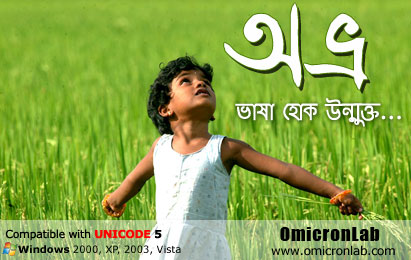Adhering to professional journalism he included comments from many developers who contributed during the history of Bangla computing. We had more than 20 proprietory Bangla input software from 1984 to 2002 and the most popular of them was Mustafa Jabbar's Bijoy.
At first came Bangla fonts - MainulLipi (1986), ShahidLipi & JabbarLipi(1987) - but separate Bangla keyboards were not available for them. In 1987, the Bangla input software Bijoy and in 1988, the first Bangla Typing interface in the same name (Bijoy) were invented by Mustafa Jabbar's 'Ananda Computers'. Its lead programmer Pappan was the key person behind this development. Bijoy's interface was Apple-Macintosh based and that time the price of Apple-Macintosh computer was too high. But Bijoy and Apple Computers proliferated, especially in the Bangla Publishing industry because the initial fonts were all developed using the advantage of four layer keyboard of Macintosh, which solved problems relating to Bangla conjunct letters. The software also achieved popularity because of no competition at that stage.
The users of IBM computers had to wait till 1992 when Bangla word processing software 'Barna' was invented by two higher secondary level students Reza-E Al Amin Abdullah (Aunko) and Md. Shahidul Islam (Sohel) (source). Barna used three types of keyboard - Munir, Bijoy and Easy keyboard. Bijoy, still a proprietory software, released an interface for IBM PC users in 1993.
But the real boost in Bangla computing came when in 2003 Mehdi Hasan, a medical student developed the open source Avro software using Unicode which was further developed during last six years by Mehdi and his friends Rifatunnabi, Tanvin Islam Siam, Ryan Kamal, Shabab Mustafa and Nipun Haq.
Avro uses different keyboard layouts which also include unijoy layout developed by Ekushey, an open source Bangla Computing platform. This Unijoy input system layout has been alleged to be a clone of Bijoy, although the fact is that most Avro users (above 90%) use phonetic or transliteration input system, i.e. typing in roman characters rendered in Bangla scripts. Unijoy is actually 99% similar to bijoy with these exceptions:
1. You press AltGr to activate full Bangla Vowels, instead of the 'kar's
2. AltGr enables \ or | to appear in their positions.
3. ~ and ` are taken in normal mode. In AltGr mode they act as ZWNJ and ZWJ
4. There is no Double Dari.
5. Other differences can be spotted easily by looking at the layout. There is an entirely different AltGr mode, that the traditional bijoy does not have.
(source)
However Mr. Jabbar has already won a legal battle protecting the copyright of his Bijoy keyboard layout and threatens the open source Bangla computing movement by saying that the Unijoy keyboard layout is stolen from Bijoy and it should be stopped.
Well, there is no denying Mr. Mustaffa Jabbar's role in the advent of Bangla computing. But probably Mr. Jabbar expects that every Bangla user should pay to use only his faulty software to type in Bangla. The software does not even have a website! The most users of Bijoy have installed the pirated version. Yet he is comfortable with this piracy and threatens to kill competition with copyright because he wants monopoly. There are also claims that he included Unicode option in Bijoy by cloning from Unijoy! Why does not he release his software as a free open source software and then let people decide which one should they use?
The monopoly of Bijoy was daunted as the Bangladesh election commission used Avro for its national ID Card project. By opting for open source the government has saved some public fund, otherwise they would have had to pay in millions for Bijoy.
Mr. Mustafa Jabbar has for long attacked the open source software movement in his writings. He has spoken against the government using free/open source software saying that it is possible for socialist states, not for free market economy(?).
Here are more developers take on this debate - Omi Azad, Dark Lord & Amader Projukti Team.
Omi Azad said:
জব্বার বাংলা নিয়ে ব্যবসা শুরু করেছে। এখানে বিজয়/ইউনিজয় কোনো বিষয় না। আজকে একুশে বা অভ্র আছে বলে সারা বিশ্বের মানুষ বাংলা ব্যবহারে সক্ষম হয়েছে। বাংলাকে বিশ্বায়ন করেছে একুশে, এই কথার কোনো বিকল্প নেই।
অভ্র/একুশে কেউই আমাদের ভাষা নিয়ে ব্যবসা করেনি আর আমি আশা করি তারা কোনোদিন করবেও না। কিন্তু জব্বার চায় পৃথিবীতে যারা বাংলা ব্যবহার করবে, তারা সবাই উনাকে টাকা দেবে।
Jabbar is doing business with Bangla language. Here Bijoy/Unijoy is not an issue. Today the whole world can use Bangla computing thanks to Avro/Ekushey. Bangla was globalized by Ekushey, there is no denying that.
Avro and Ekushey, none ever engaged to do business with our language and we hope they never will. But Jabbar wants that whoever uses Bangla computing should pay him.
On the occasion of Ekushey February/International Mother Language Day I would like to thank those open source evangelists of Avro and Ekushey and also Hasin Haider, S. M. Mahbub Morshed and Ahmed Arup Kamal and many more heroes who saved the Bangla users from the monopoly of businessmen like Mustafa Jabbar.
Disclaimer: I am not associated with Avro or Ekushey and do not have anything personal for or against the persons quoted. I just felt that I should show my gratitude to those individuals and their technology which has eased my life in Bangla computing and I should credit them for all the great (and free) service they have rendered. "Let language be free" - is the tagline of the Avro software and I will also fight for this belief.

























Thanks to them, I can now try to read Bengali with Safari.
ReplyDelete